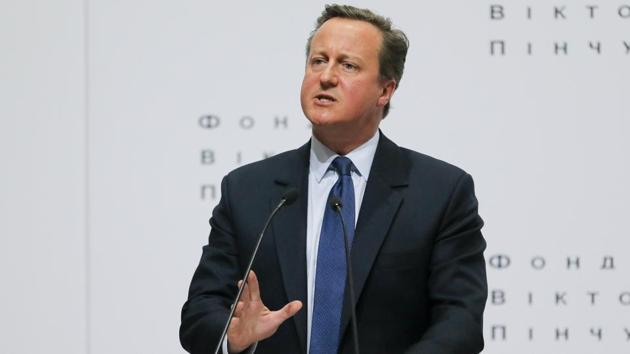Ex-UK PM David Cameron says he is ‘sorry’ for Brexit divisions
David Cameron, 52, was Britain’s youngest prime minister in 200 years when he entered 10 Downing Street in 2010 at 43, but left behind a withering legacy in 2016 that promises to unsettle the country for years
The UK prime minister who ordered the 2016 EU referendum and promptly resigned to his home in Oxfordshire when it threw up the vote to leave the group, surfaced on Saturday to apologise for the ensuing deep divisions, but insisted that he was right to hold it.

David Cameron, 52, was Britain’s youngest prime minister in 200 years when he entered 10 Downing Street in 2010 at 43, but left behind a withering legacy in 2016 that promises to unsettle the country for years. Speaking to The Times ahead of the release of his book, For The Record, he insisted he was right to hold the referendum, but claimed he is “truly sorry” at the uncertainty and division it has brought, admitting, “I failed.”
The referendum result, he said, left him “hugely depressed”, adding that he worries “desperately” about the consequences. Some people will never forgive him, he regretted, amid reports that bookshops in areas that voted to remain in the EU would not stock his 752-page tome.
Cameron criticised UK Prime Minister Boris Johnson for proroguing parliament and expelling 21 Conservative MPs who voted with the opposition last week in the House of Commons.
The UK is due to leave the EU on October 31, but the deadline is clouded by intense politics in Westminster, legal challenges in courts and some attempts to hold fresh negotiations for an agreement with Brussels.
According to him, Johnson and cabinet minister Michael Gove behaved “appallingly” during the referendum. The two leaders and Conservative MP Priti Patel were among leading lights of the campaign to leave the EU.
Claiming to have “many regrets” about the referendum vote, he said: “From the timing of the vote to the expectations I allowed to build about the renegotiation, there are many things I would do differently”.
“I did not fully anticipate the strength of feeling that would be unleashed both during the referendum and afterwards, and I am truly sorry to have seen the country I love so much suffer uncertainty and division in the years since then”.
“But on the central question of whether it was right to renegotiate Britain’s relationship with the EU and give people the chance to have their say on it, my view remains that this was the right approach to take”.
“I believe that, particularly with the eurozone crisis, the organisation was changing before our very eyes, and our already precarious place in it was becoming harder to sustain. Renegotiating our position was my attempt to address that, and putting the outcome to a public vote was not just fair and not just overdue, but necessary and, I believe, ultimately inevitable.”
Labour and other opposition parties believe Cameron ordering the referendum had more to do with politics within the Conservative party than any strong demand in the country. His record of years of deep funding cuts and austerity during his tenure was upstaged by the Brexit legacy, they allege.






